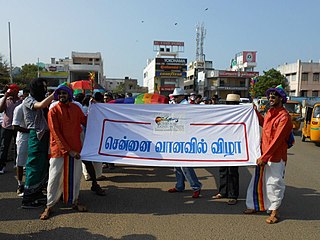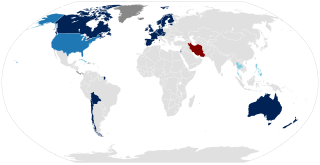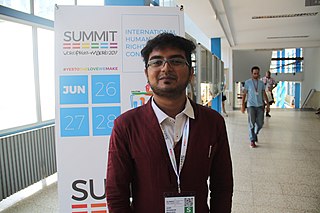The legal status of transgender people varies greatly around the world. Some countries have enacted laws protecting the rights of transgender individuals, but others have criminalized their gender identity or expression. In many cases, transgender individuals face discrimination in employment, housing, healthcare, and other areas of life.

In the Indian subcontinent, hijra are transgender, intersex, or eunuch people who live in communities that follow a kinship system known as guru-chela system. They are also known as aravani, aruvani, and jogappa. The term used in Pakistan is khawaja sira, the equivalent of transgender in the Urdu language.
Hanna Zoey Tur is an American broadcast reporter and commercial pilot who created Los Angeles News Service with fellow reporter and then-wife Marika Gerrard.
Jenny Hiloudaki is a Greek DJ, book author and former brothel madam who regularly attracted the attention of the Greek media. Her affair with a district attorney caused a national scandal.

Lesbian, gay, bisexual, and transgender (LGBT) people in Pakistan face legal and social difficulties and persecution compared to non-LGBT persons. Pakistani law prescribes criminal penalties for same-sex sexual acts.

Lesbian, gay, bisexual, and transgender (LGBT) people in India face legal and social challenges not experienced by non-LGBT people. There are no legal restrictions against gay sex or gay expression within India. Same-sex couples have some limited cohabitation rights, colloquially known as live-in relationships. However, India does not currently provide for common law marriages, same-sex marriage, civil unions, guardianship or issue partnership certificates.
Marci Lee Bowers is an American gynecologist and surgeon who specializes in gender-affirming surgeries. Bowers is viewed as an innovator in gender confirmation/affirmation surgery, and is the first transgender woman to perform such surgeries.

Lesbian, gay, bisexual and transgender (LGBT) rights in Tamil Nadu are the most progressive among all states of India. Tamil Nadu was the first state in India to introduce a transgender welfare policy, wherein transgender individuals can access free gender affirmation surgery in government hospitals and various other benefits and rights. The state was also the first to ban forced sex-selective surgeries on intersex infants, and also the first state to include an amendment in its state police guidelines that expects officers to abstain from harassing the LGBTQIA+ community and its members. The state also became the first to ban conversion therapy as well as the first to introduce LGBTQIA+ issues in school curricula.

Jin Xing is a Chinese ballerina, modern dancer, choreographer, actress, founder and artistic director of the contemporary dance company Shanghai. She is a transgender celebrity.

Laxmi Narayan Tripathi is a transgender/Hijra rights activist, bollywood actress, Bharatanatyam dancer, choreographer and motivational speaker in Mumbai, India. She is also the Acharya Mahamandaleshwar of kinnar akhada. She was born in Malti Bai Hospital on 13th Dec 1978 in Thane. She is the first transgender person to represent Asia Pacific in the UN in 2008. At the assembly, she spoke of the plight of sexual minorities. "People should be more human-like. They should respect us as humans and consider our rights as transgenders," she said. She was a contestant on the popular reality show Bigg Boss in 2011. Her efforts helped the first Transgender team to scale a Himalayan peak in 2020.
Chennai has LGBTQIA cultures that are diverse concerning- socio-economic class, gender, and degree of visibility and politicisation. They have historically existed in the margins and surfaced primarily in contexts such as transgender activism and HIV prevention initiatives for men having sex with men (MSM) and trans women (TG).

The Chennai Rainbow Pride March has been held by members of Tamil Nadu LGBTIQA+ communities every June since 2009. The pride march is organised under the banner Tamil Nadu Rainbow Coalition, which is a collective of LGBT individuals, supporters, and organizations working on human rights and healthcare for the LGBTQIA community. The Pride March occurs on the final Sunday of June every year. The Pride March is usually preceded by a month-long series of events organized by NGOs and organizations to inculcate awareness and support for the LGBTQ community, such as panel discussions, film screenings, and cultural performances. The Chennai Vaanavil Suyamariyadhai Perani a.k.a. Chennai Rainbow Self-Respect March is known for being inter-sectional in nature as it addresses issues with multiple axes such as caste, class, religion coupled with gender discrimination.

Not all armed forces have policies explicitly permitting LGBT personnel. Generally speaking, Western European militaries show a greater tendency toward inclusion of LGBT individuals. As of 2022, more than 30 countries allow transgender military personnel to serve openly, such as Argentina, Australia, Austria, Belgium, Bolivia, Brazil, Canada, Chile, Czechia, Denmark, Estonia, Finland, France, Germany, Greece, Ireland, Israel, Japan, Mexico, the Netherlands, New Zealand, Norway, Spain, Sweden, Switzerland, Ukraine and the United States. Cuba and Thailand reportedly allowed transgender service in a limited capacity.

Lesbian, gay, bisexual and transgender (LGBT) people in Kerala face legal and social difficulties not experienced by non-LGBT persons. However, Kerala has been at the forefront of LGBT issues in India after Tamil Nadu. It became one of the first states in India to establish a welfare policy for the transgender community and in 2016, proposed implementing free gender affirmation surgery through government hospitals. Same-sex sexual activity has been legal since 2018, following the Supreme Court ruling in Navtej Singh Johar v. Union of India. In addition, numerous LGBT-related events have been held across Kerala, including in Kochi and Thiruvananthapuram. However, there is also increasing opposition to LGBT rights recently as evidenced by the anti-LGBT campaigns spearheaded by meninist groups and Muslim organisations like Indian Union Muslim League, Samastha and Jamaat-e-Islami.

Gopi Shankar Madurai is an Indian equal rights and Indigenous rights activist. Shankar was one of the youngest, and the first openly intersex and genderqueer statutory authority and one of the candidates to contest in 2016 Tamil Nadu Legislative Assembly election. Shankar is also the founder of Srishti Madurai Student Volunteer Collective. Shankar's work inspired the Madras High Court to direct the Government of Tamil Nadu to order a ban on forced sex-selective surgeries on intersex infants. In December 2017, Shankar was elected to the executive board of ILGA Asia. In August 2020, the Ministry of Social Justice and Empowerment appointed Shankar as the South Regional representative in the National Council for Transgender Persons.
Tamil sexual minorities are Tamil people who do not conform to heterosexual gender norms. They may identify as LGBTQIA. It has been estimated that India has a population of 2.5 million homosexuals, though not all of them are Tamil, and not all Tamils live in India.
The following list is a partially completed compilation of events considered to have a profound effect on the welfare or image of Tamil sexual minorities. The use of bold typeface indicates that the event is widely considered to be landmark:
Padmini Prakash is an Indian news anchor, actress and transgender rights activist. She became the first openly trans person to work as a news anchor in India when she joined the Tamil channel Lotus News Channel on 15 August 2014.
Gazal Dhaliwal is an Indian screenwriter who wrote the screenplay and dialogues for Vinod Chopra Films’ Ek Ladki Ko Dekha Toh Aisa Laga, starring Rajkummar Rao, Anil Kapoor and Sonam K Ahuja. Previously, she worked on Alankrita Shrivastava's critically acclaimed Lipstick Under My Burkha as the dialogue writer and she wrote the dialogues and co-wrote the screenplay for Qarib Qarib Singlle, directed by Tanuja Chandra, starring Irrfan Khan and Parvathy. She also wrote additional dialogues for Wazir that starred Amitabh Bachchan and Farhan Akhtar.
The following is a timeline of transgender history. Transgender history dates back to the first recorded instances of transgender individuals in ancient civilizations. However, the word transgenderism did not exist until 1965 when coined by psychiatrist John F. Oliven of Columbia University in his 1965 reference work Sexual Hygiene and Pathology; the timeline includes events and personalities that may be viewed as transgender in the broadest sense, including third gender and other gender-variant behavior, including ancient or modern precursors from the historical record.










